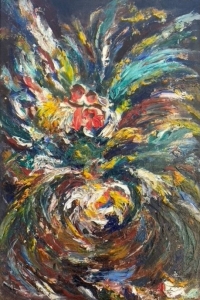The Villanova University Art Gallery, History Graduate Students Present New Exhibit

VILLANOVA, Pa.--On Friday, April 29th, from 4:00 p.m. to 6:00 p.m., the Villanova University Art Gallery will hold an opening reception for its new exhibit, Dox Thrash: Painted, Not Printed, curated by History graduate students under the direction of Dr. Whitney Martinko, PhD, associate professor of History. Dox Thrash, a Black artist working in Philadelphia in the mid-twentieth century, is best known for prints made through the carborundum process that he invented. This exhibit presents a new view of the artist by featuring five of Thrash’s little-known paintings donated to the University by Benjamin Bernstein, a prominent Philadelphia art patron, collector, and donor. Painted, Not Printed explores the history of Thrash’s paintings in conversation with works by other mid-20th century artists such as Julius Bloch, Samuel Maitin, and Paul Keene.
At the opening reception, representatives of The Dox Thrash House Project, will speak to visitors about Thrash’s life, his art, and the goals of their mission. Following this gallery talk, patrons are invited to enjoy free refreshments and beverages, explore the exhibit, and speak with the graduate student curators, university professors, and Art Gallery Director, Ms. Jennie Castillo.
Dox Thrash: Painted, Not Printed was curated by students enrolled in the public history practicum in the Villanova University graduate program in History. In addition to selecting artwork and writing gallery text, students also worked in small teams to design the exhibit, write and publish an online exhibit catalog, develop promotional material and visitor engagement initiatives.
“I've loved having the opportunity to work with the History graduate students - to draw attention to a part of Dox Thrash's oeuvre that isn't really known,” says Castillo. “It's exciting to see the inspiration and the feeling of discovery as they dig into the Villanova University's art collection.”
Work that combines intellectual and professional development is typical of public history courses in the department, notes Dr. Martinko. Past courses have produced a podcast series about the history of The Woodlands of Philadelphia and a series of online articles for Hidden City Philadelphia.
“Developing the Dox Thrash exhibit gave students a chance to think about doing history in three dimensions,” Dr. Martinko says. “Gallery exhibitions require students to analyze spatial characteristics of the gallery as well as ideas about research as they select art for exhibition and write wall labels. These types of challenges prepare our students to be top-notch historians in a variety of public-facing settings and media.”
The art gallery is located the Connelly Center on Villanova’s main campus, 800 E. Lancaster Ave, Villanova, PA 19085. The exhibit is open to the public from April 29 through May 14 from 8:00 a.m. to 7:00 p.m. Monday through Friday and 11:00 a.m. to 7:00 p.m. on Saturdays and Sundays. If you would like to learn more about the exhibit opening or exhibit content on the Villanova Art Gallery Website, email artgallery@villanova.edu or call 610-519-4612. You can also follow the art gallery Instagram page @vuartgallery and Facebook page.
About Villanova University: Since 1842, Villanova University’s Augustinian Catholic intellectual tradition has been the cornerstone of an academic community in which students learn to think critically, act compassionately and succeed while serving others. There are more than 10,000 undergraduate, graduate and law students in the University's six colleges—the College of Liberal Arts and Sciences, the Villanova School of Business, the College of Engineering, the M. Louise Fitzpatrick College of Nursing, the College of Professional Studies and the Villanova University Charles Widger School of Law. Ranked among the nation’s top universities, Villanova supports its students’ intellectual growth and prepares them to become ethical leaders who create positive change everywhere life takes them. For more, visit www.villanova.edu.
